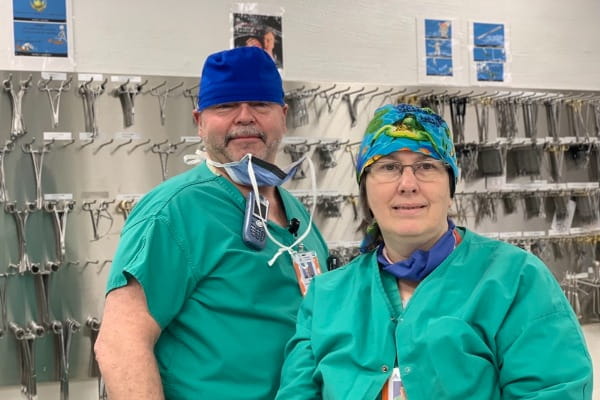Sterile Processing leaders at Ascension Via Christi earn certification

Patients should never have to wonder whether their medical equipment is clean and sterilized, say the leaders of Ascension Via Christi St. Francis’ Sterile Processing department.
That’s why Robbi Pierce-Sawyers, department manager, and Richard Kavanaugh, program coordinator, went the extra mile and worked toward Gold Crown Certification by the International Association of Healthcare Service Central Material Management.
Their accomplishment, one that less than 500 sterile processing professionals worldwide have achieved, makes them among the first within Ascension.
Seeing the department’s need for leadership and more efficient processes, Pierce-Sawyers and Kavanaugh completed more than 400 hours of certification and testing in just eight months, finishing in June 2020.
“We achieved this honor by keeping each other accountable, studying every night, staying dedicated to improving our team and helping them reach their goals,” says Pierce-Sawyers, who has served Ascension in various roles since 2016. “We wanted to show them that anything is possible if you put your mind to it.”
Pierce-Sawyers began working in Sterile Processing in Fall 2019 and after completing two of four certifications was offered a leadership role the following spring.
Kavanaugh, who worked in sterile processing for two years for a different hospital, joined the team around the same time and was named program coordinator last April.
“It’s truly up to you, how far you want to go and how driven you are to earn the certifications,” says Kavanaugh, an Air Force veteran and former EMS medic. “It’s demanding and you’re always on the go, but Robbi does a great job of keeping the team motivated.”
Wanting to lead by example and improve the processes in Sterile Processing, both studied for up to six hours a night following their daytime and occasional weekend shifts.
“What we’re trying to instill in our team is that to be the best we can be, we need to have the knowledge behind us,” says Pierce-Sawyers. “The operating rooms can’t operate without us.”
Sterile processing technicians must execute their tasks with a high level of attention to detail and do so quickly. They must be able to distinguish between different types of instruments for surgical procedures in orthopedic, bariatric, cardiac, neurological and other surgical specialties.
 “There’s something cool about being the unsung hero, in the basement of the hospital, with four million instruments coming through here -- for babies all the way to the elderly,” says Pierce-Sawyers.
“There’s something cool about being the unsung hero, in the basement of the hospital, with four million instruments coming through here -- for babies all the way to the elderly,” says Pierce-Sawyers.
Even before COVID-19, the Sterile Processing department operated 24 hours a day, seven days a week and its team members were required to wear layers of PPE and follow universal and precise processes. Consequently, while their workload and expectations haven’t changed much, says Pierce-Sawyers, “They have buckled down and improved processes and taken real ownership.”
To further educate and encourage their diverse team, they created picture guides for medical terms and, with the help of bilingual team members, translated materials from English to Spanish. They also developed a “Couch to Certification” program for those who want to achieve further certifications.
While working in sterile processing doesn’t require prior experience, associates must complete a basic training course within their first six months. “But we ask that our team always look for opportunities to improve,” says Pierce-Sawyers, noting that it is an area of constant change and learning.
“Robbi’s always got us ready for a new day and truly sets us up for success at every turn, every shift change,” says Kavanaugh.
It’s a team effort, she says. “We truly care about caring for people and we want everyone to feel safe.”
Last updated: April 30, 2021